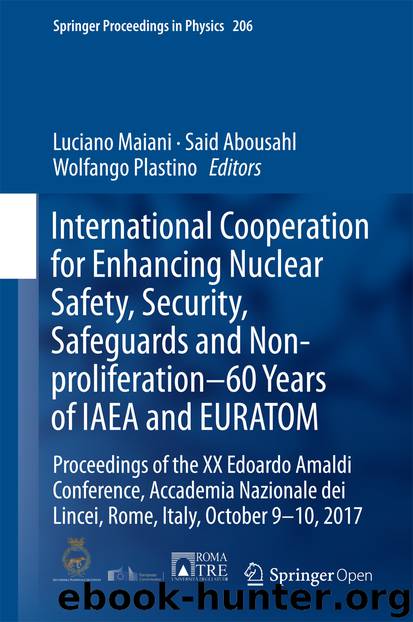International Cooperation for Enhancing Nuclear Safety, Security, Safeguards and Non-proliferation–60 Years of IAEA and EURATOM by Luciano Maiani Said Abousahl & Wolfango Plastino

Author:Luciano Maiani, Said Abousahl & Wolfango Plastino
Language: eng
Format: epub
Publisher: Springer Berlin Heidelberg, Berlin, Heidelberg
b.Iran will continue to respect the JCPOA, proceed with its limited nuclear program, and still have access to international markets, at least the European ones.
Things could be further complicated if sanctions against Iran were to be imposed not on the basis of the JCPOA, but on the basis of its missile program and its alleged support for so-called terrorist activities.
In any case, if Iran is able to retain its access to the international market, and if the JCPOA can preserved, then Saudi Arabia, the UAE and others will be unhappy and may decide (as they have already announced) that they will carry on the exact—if not more—same nuclear activities that Iran is, thus bringing into the region a sort of nuclear competition in slow motion.
If, on the other hand, Iran is denied access to international markets, then, as we said, the pressure inside Iran for abandoning the JCPOA could grow, with the risks for nuclear proliferation in the region becoming very significant.
Needless to say, the best option for preserving nuclear non-proliferation in the region would be the preservation of the JCPOA in substantial terms. But at the same time, it would be useful to try to soften the regional antagonism between Saudi Arabia/UAE and Iran.
The US began deploying nuclear weapons in other NATO countries well before the entry into force of the NPT. There were several motivations for this decision. One was related to the issue of making the so-called US nuclear umbrella more visible and clear, and another was to persuade some NATO countries, particularly Germany, not to acquire nuclear weapons on their own. A further expansion of this idea took place in the 1960s with the proposal of creating a multinational (naval) NATO force, the so-called multilateral force (MLF), with direct control of nuclear weapons. The MLF was deemed to be unacceptable by Russia, so it was abandoned by the US in order to establish the NPT. But the de facto agreement with Russia was that the previous deployments of US nuclear weapons on the territory of allied countries would not be considered an obstacle to the establishment of the NPT. US nuclear weapons deployed on the territories of allied countries were, and are, classified as “dual-key” (meaning the US retains possession of the nuclear weapons, while the host country provides the relevant delivery system in the case of use of such weapons), and as “single-key” (when both the nuclear weapons and the delivery systems belong to the US). Note that, mainly in the case of dual-key weapons, there is still a question concerning the compatibility of such arrangements with the NPT requirement that the control of nuclear weapons cannot be assigned to non-NWS. The dual-key arrangement is also referred to as “nuclear sharing”. The non-NWS that host US nuclear weapons are Italy, Germany, Turkey, the Netherlands, and Belgium. By any standard, the military utility of either the single-key or dual-key weapons deployed in Europe is absolutely negligible.
Such weapons are relevant only for political symbolism, but are nevertheless very problematic for many other aspects.
Download
This site does not store any files on its server. We only index and link to content provided by other sites. Please contact the content providers to delete copyright contents if any and email us, we'll remove relevant links or contents immediately.
The Complete Stick Figure Physics Tutorials by Allen Sarah(7362)
Secrets of Antigravity Propulsion: Tesla, UFOs, and Classified Aerospace Technology by Ph.D. Paul A. Laviolette(5364)
Thing Explainer by Randall Munroe(3930)
The River of Consciousness by Oliver Sacks(3598)
The Order of Time by Carlo Rovelli(3188)
How To by Randall Munroe(3101)
A Brief History of Time by Stephen Hawking(3022)
I Live in the Future & Here's How It Works by Nick Bilton(2990)
What If?: Serious Scientific Answers to Absurd Hypothetical Questions by Randall Munroe(2694)
The Great Unknown by Marcus du Sautoy(2688)
Midnight in Chernobyl by Adam Higginbotham(2541)
Blockchain: Ultimate Step By Step Guide To Understanding Blockchain Technology, Bitcoin Creation, and the future of Money (Novice to Expert) by Keizer Söze(2481)
Networks: An Introduction by Newman Mark(2403)
The Meaning of it All by Richard Feynman(2348)
Easy Electronics by Charles Platt(2325)
The Tao of Physics by Fritjof Capra(2268)
Midnight in Chernobyl: The Untold Story of the World's Greatest Nuclear Disaster by Adam Higginbotham(2220)
Introducing Relativity by Bruce Bassett(2114)
When by Daniel H Pink(2112)
